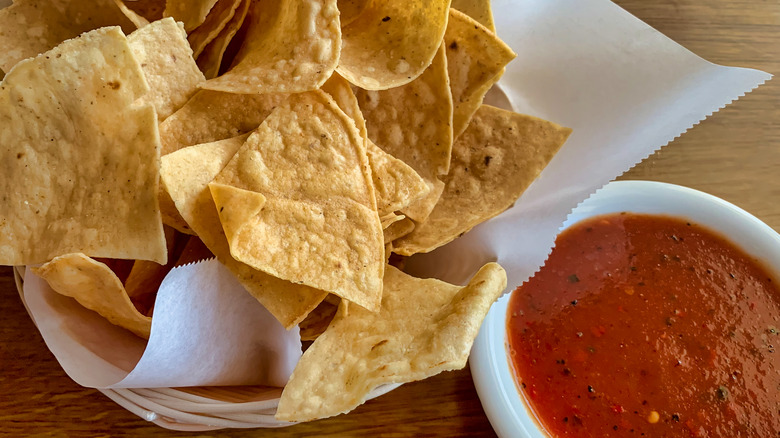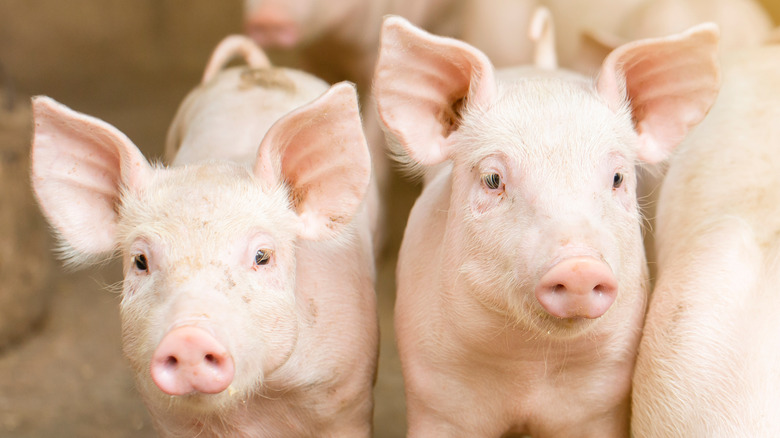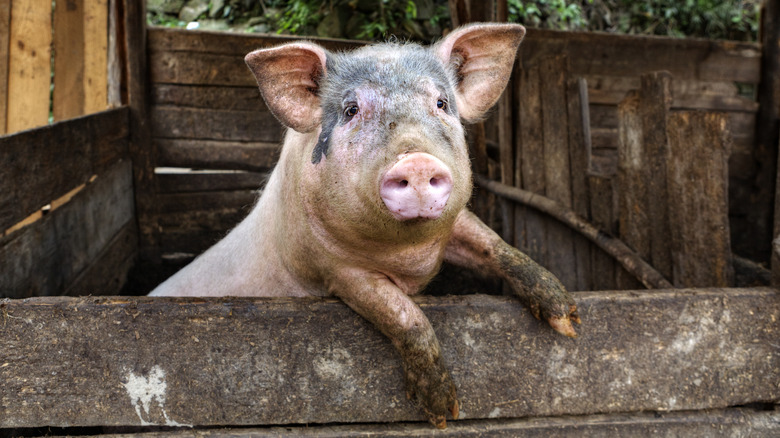Why You Should Avoid Foods With Lard If You're Vegan
That bowl of fresh tortilla chips sure looks good. But were they fried in vegan oil? Perhaps not. Tortilla chips are just one of many foods that can contain a covert non-vegan ingredient: lard.
Lard is a by-product of the pork industry and acts as a cooking oil in many foods that otherwise seem vegan. Once the pigs have been slaughtered, various parts of the body where fat accumulates (namely the shoulder, butt, and belly) are cooked slowly until the fats have melted off the flesh (via Healthier Steps). Now separate from the meat, lard takes on a life of its own. Lard is used to grease baking pans, make pastries, or even act as an ingredient in mayonnaise (via Kitchen Substitute). Along with other non-vegan culprits like gelatin, lard appears in various foods ranging from french fries to wedding cakes. You can find lard in refried beans, salad dressing, cornbread, and grocery store pie crusts (via Healthier Steps). Lard can even appear in standard formulations of soap, according to Allure.
If your vegan lifestyle aims for less cruelty and more sustainability, you'll want to add lard to your "hard no" food list. Here's why.
Lard comes from pigs, and pigs are intelligent animals
If you're vegan for because you love animals, avoiding lard is a no-brainer. That's because pigs are intelligent. According to a 2015 International Journal of Comparative Psychology study, pigs share cognitive complexity with animals that most people think of as smart. Research indicates that pigs have personalities, they experience emotions, and they have some level of self-awareness. Many vegans are distraught at the idea of killing and eating any animal, especially one with this kind of intellectual ability.
The urban myth that pigs are more smarter than dogs? While that isn't exactly true, neuroscientist Lori Marino told the Huffington Post, "as we compared the literature on pigs and other animals, we did find that in many domains pigs are as cognitively complex as dogs, primates." Sadly, she admits that even this scientific proof isn't enough to persuade most people to give up pork and its by-products. But, she said, "I hope the evidence on how aware, emotional and sensitive [pigs] are will reach some people who have the capacity to be empathic."
The pork industry has a sustainability problem ... and it's getting worse
Hog farming is dirty business. According to a 2020 study in the journal Biogeochemistry, farmers deal with massive amounts of manure that are stored in the open, off-gassing hazardous greenhouse gasses methane and nitrous oxide. Pig manure also contains ammonia, which can create harmful algal blooms (HABs) that can cause drinking water to become unsafe for consumption. In coastal areas, manure run-off can destroy local seafood economies and even wreak respiratory havoc on humans.
And while, yes, pork has a smaller carbon footprint than red meat because pigs don't belch methane, Peter Smith of University of Aberdeen tells the BBC, "the downside is that [chickens and pigs] are not able to eat grass, so compete with humans for plant-based foods." The United Nations predicts a global population of nearly 10 billion people by the middle of the century. In light of that, feeding pigs food that could be fed directly to humans doesn't make sense.
Whether you're a vegan for the animals or for the environment, you've got plenty of logical reasons to leave lard alone – no matter how tasty those tortilla chips look.


